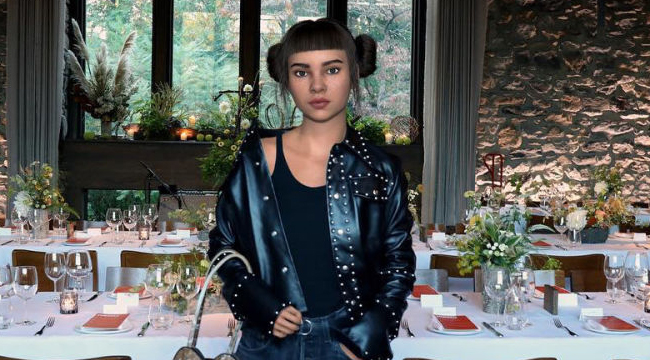
What it means to be famous, and who gets to be such a thing, is in constant flux. Because why one is worthy of that elusive and addictive shine shifts based on our ever-changing culture. And now, in the age of social media influencers, viral and guerrilla marketing campaigns, and brand ambassadors, the definition of who matters to consumers is experiencing a kind of renaissance. Thanks to the likes of YouTube and Instagram, the people who determine everything from what brands are hot to how one should feel about certain political movements is often more dependent upon the number of followers you have than, say, being a professional actor or musician. Nowhere is that more apparent than with the CGI Instagram influencer Miquela Sousa aka Lil Miquela.
The self-styled “robot” boasts 1.5 million followers on Instagram. And Lil Miquela does all the things you’d expect from an influencer. She goes to high-end restaurants, poses for photos in front of visually pleasing walls, and has even done an ad campaign for Ugg — just, virtually, as she’s all the creation of LA-based start-up Brud. And according to the Wall Street Journal, Brud is betting on the ability to take Miquela’s vast following and ever-unfolding story (which includes two fellow robots named Blawko and Bermuda) and turn it into an entire world of fellow CGI characters.
The start-up just raised $6 million in venture capital funding, the latest indicator that they’re planning on taking the Lil Miquela blueprint to a wider audience.
On their website, Brud claims to be a technology start-up that initially developed Miquela as a fully conscious AI capable of extreme empathy and compassion, whom they “liberated” from a lab when they found out she was to be used for the “sick fantasies of the 1 percent.”
Insiders, however, tell the WSJ that Brud is actually performance art — a company closer to a new media venture that combines the size and complexity of the Marvel universe with the beauty and drama of the Kardashian empire.
Cyan Banister, a partner at a VC fund which gave Brud $100,000 in funding in May 2017, said, “You can create the Kardashians without any of the inherent issues that come with being human.”
And that is indeed what has been unfolding on Miquela’s Instagram: with a slowly expanding cast of characters, including a blonde, Trump-supporting villain named Bermuda. Brud has created an entire world — a reality show played out one Instagram post at a time. You could see it succeeding in the same vein as the Real Housewives franchise — casts of characters who have their own personal dramas, which viewers (in this instance, followers) can watch unfold, bit by bit.
But Brud’s expansion points to a greater crisis when it comes to social media: the line between what is real and what is manufactured.
One appealing aspect of social media influencing is its supposed marriage to authenticity. Where the traditional model of celebrity relies on an air of distance, even mystery, influencers can—whether by sharing personal news, opinions, or recommendations—cultivate a sense of vulnerability and realness that makes their followers feel deeply connected. And while issues (such as sponcon and undisclosed ad partnerships) have arisen with the influencer model in the past, Lil Miquela’s very existence throws the entire model into question. If a CGI character, whose whole story is written by a team of creatives, can cultivate such a large following by aping the very messiness at the core of humanity, what does that mean for the rest of us?
As we experience this cultural shift, we’re fascinated to see how this moves the needle for consumers: will we continue to trust these brands, these partnerships in which we’re told what to buy? But it almost doesn’t matter if CGI influencers like Lil Miquela or real or not real. Like social media before them, they’re likely not going anywhere. So now, it’s just a matter of seeing how far down the rabbit hole Lil Miquela and her ilk go.
